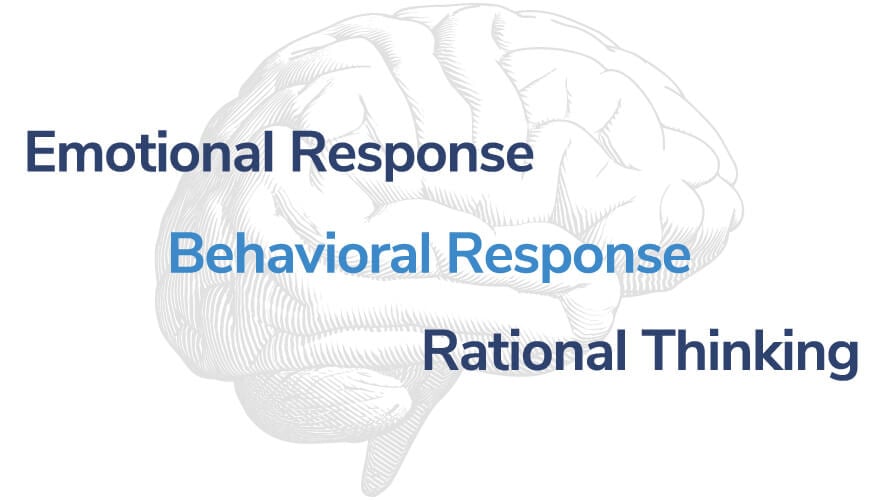Managing Stress, Leading, and Serving Through Crises
Meet Tim. Everyone at work knows that Tim is there for his team and his internal customers. He checks on them regularly. Tim is also very good at seeing situations from others’ perspectives. He makes decisions with his team and customers’ best interests in mind. He provides the right resources and knowledge they need to meet the objectives. Tim leads with empathy. He is a clear example of a servant leader. But how does this skill play out during a crisis?
Robert Greenleaf first coined the phrase “servant leadership” in his 1970 essay, The Servant as a Leader.
Under this model, the team leader serves first—he or she focuses on the needs of others, especially team members, before considering his or her own. The team leader acknowledges other people’s perspectives, gives them the support they need to meet their work and personal goals, involves them in decisions where appropriate, and builds a sense of community within the team. Servant leadership focuses on behavior.
Today, more than plans and technical skills, it is commonly admitted that leadership is behavior-based and that emotional intelligence, which includes having strong soft skills, is the key to lead efficiently, especially during crises. In a very insightful article published in the Crisis Response Journal in June 2019, Eric McNulty refers to a study conducted by the Harvard National Preparedness Leadership Initiative, which observed that typical leader’s behaviors that had improved team performance in a crisis management environment were boosted by confidence (88 percent), the ability to manage stress (86 percent), adapting well to changes (84 percent), and communicating clearly (83 percent) .
It is fair to say that all of these depend on whether stress is well-managed or not.

Crises are by nature unpredictable and uncertain. Our brains process uncertain and unpredictable events as life-or-death threats. The amygdala lights up our fight-or-flight response. Our higher brain centers are immediately highjacked. Our emotions are out of control and it shuts down our rational thinking. While that behavioral response may save us in life-or-death situations, it handicaps the strategic and operational thinking needed during crises.
During a crisis, one of the key steps to manage our stress and our emotions and to foster our perspective and analytical reasoning is to de-shame. This concept was highlighted by Casey Erin Clark, cofounder of Vital Voice Training. We are all human beings. We were built with this internal alarm bell and to feel what we feel. This is our natural survival tool kit.
While dealing with a crisis, recognizing stress and emotions allows us to be more authentic. We are keener to listen, care, and support others with their own stress level and emotions. That works for C-suite executives. Keep in mind that although C-suite executives know how to handle important business deals and situations, crises may take them out of their comfort zone and trigger stress.
So, as a servant leader, Tim may often say to himself “As the crisis leader, I am not supposed to tell that I am stressed out,” or “I need to show up strong because the company and my team need me.” If he wants to be efficient and serve his team and company accordingly, he needs to realize that feeling stressed is totally normal and should be acknowledged.
Where excellence and psychological safety meet is the “high-performance zone,” as Amy Edmondson, Harvard Business School professor, calls it. During the COVID-19 crisis, Edmondson reminds us that “one of the most important factors in delivering safe and effective care is psychological safety…. It is a belief that the workplace is safe for speaking up with ideas, questions, concerns, and even mistakes.” (Learn more in her video, “The importance of psychological safety.”)
A couple of years ago, our servant leader example Tim faced a site intrusion that he had to investigate. He was concerned—this was a high-visibility investigation. That night, the security guard on site panicked at the intrusion, and his immediate reaction was to run and hide. The guard did call the security operations center and the police for support. But the next day, Tim heard the security officer had been traumatized by the incident and had to take sick leave. Plus, the rest of the team had found out about the incident and was concerned about its team member.
After the incident, the vendor’s first reaction was to go over the failures and vulnerabilities of the team’s response plan that were uncovered during the incident. However, Tim realized how important it was to let the team explain its side of the incident. The team was under a lot of pressure to secure the site, and this incident had to be handled with care. Tim figured that giving the security guard and the team an opportunity to express their level of stress and fear would show them that he cared about their wellbeing. Tim also wanted to re-emphasize the fact that he trusted them to do their job every day.
So, during the debriefing, he gave them the space to talk about the processes in place, the communication flow between the team members, and above all, he asked them how they felt about the incident that night. Acknowledging the stress felt by the security guard and recognizing the rest of the team focused the attention on the human nature of the team. They understood it was all right to feel stressed at times.
This in-depth, de-shamed debriefing led to three positive outcomes:
- the vendor’s team committed to take corrective actions despite the difficulties;
- the overall team communicated better and trusted Tim even more after this occurrence; and
- Tim was able to serve his internal customers beyond expectations.
De-shaming and building a safe space for our teams and internal customers allows all of us, business resilience professionals, to focus on the team and the company’s objectives, and to build strong foundations for our actions. In today’s world, leading with such level of authenticity and humility allows us to bring clarity to our stakeholders amidst uncertain and unpredictable incidents and crises.
Alexandra Hoffmann is the CEO of Alexandra Hoffmann Consulting (AHC) and a member of ASIS International. AHC is a woman-owned company that promotes diversity and blends complementary professional expertise, background, and experience through various partnerships.
Thanks to a career with the French government and large international corporations, Hoffmann has a rich operational and multicultural experience base with a strong expertise in business resilience, its boosting factors, and best practices to manage it. Hoffmann has an LLB in Criminal Law from Paris University, France, an M.Sc. in Corporate Security from John Jay College of Criminal Justice, New York, and MBA from the University of Phoenix, USA. Hoffmann is also a certified coach, trained in neurosciences, and a certified yoga teacher.
